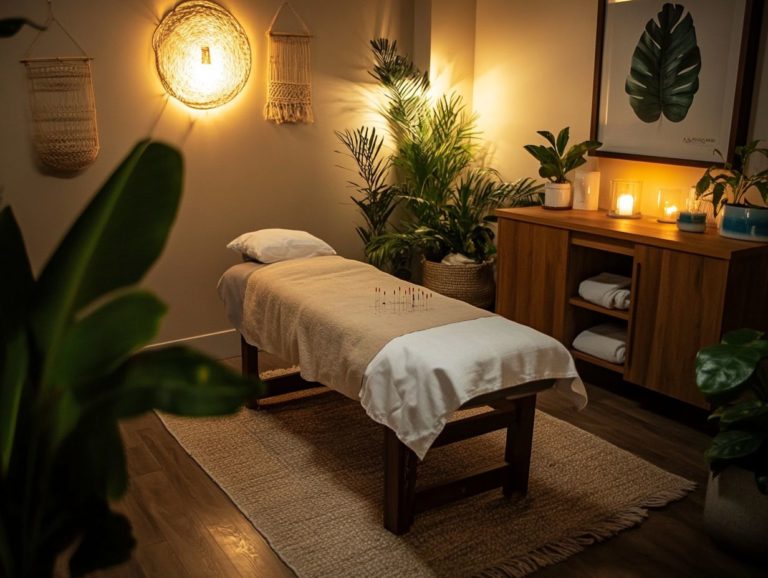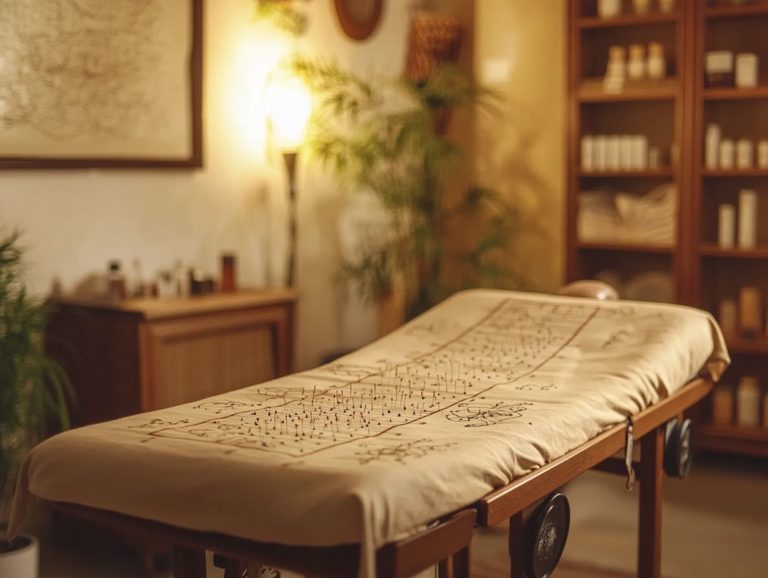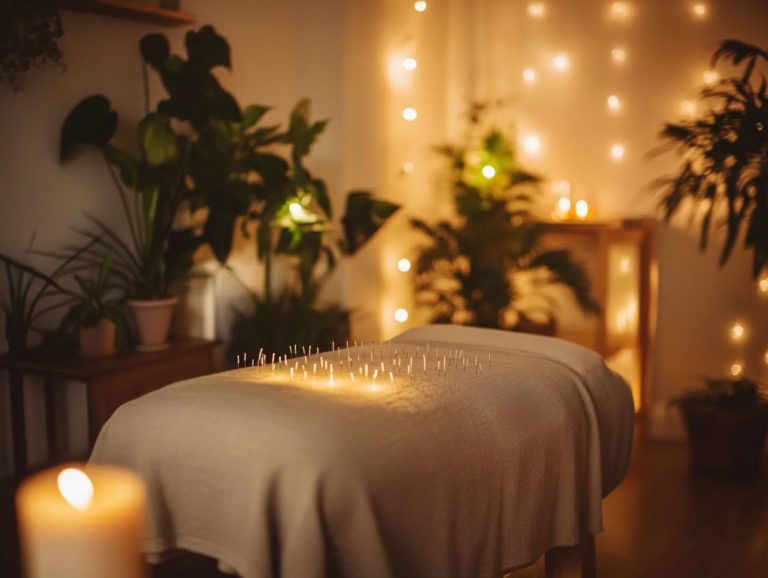5 Popular Myths About Acupuncture Explained
Acupuncture often ignites a mix of curiosity and skepticism. Despite its rich history and rising popularity, several myths continue to linger about this ancient practice.
Get ready as we dive into five common myths about acupuncture, exploring its potential benefits that extend well beyond just managing pain while shedding light on how it truly works.
It also covers the various types of acupuncture, important safety considerations, and what you can expect from your sessions. Don t wait to discover the truth behind acupuncture, empowering you to make informed choices about this holistic approach to wellness.
Contents
Key Takeaways:
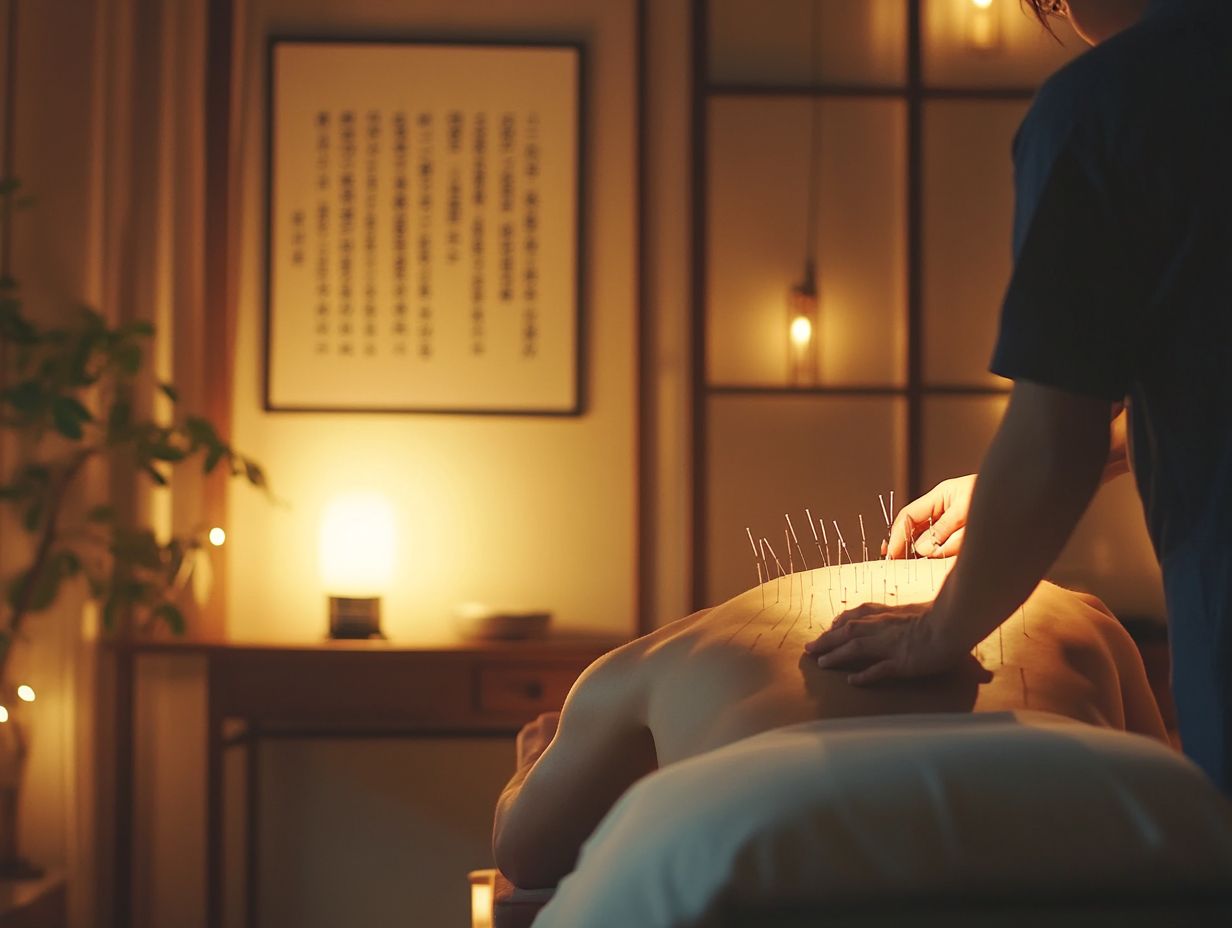
Acupuncture is not as painful as it seems. The needles used are extremely thin and barely noticeable, making it a relatively painless experience.
Acupuncture is not just for treating pain. It can also benefit various non-pain-related conditions such as anxiety, insomnia, and digestive issues.
There is scientific evidence to support the effectiveness of acupuncture. It works by stimulating the body’s natural healing mechanisms and regulating the flow of energy.
1. Acupuncture Is Painful and Involves Needles
Many people think that acupuncture, an ancient method steeped in traditional Chinese medicine, is inherently painful because of those tiny needles and the insertion techniques. However, this belief often stems from misconceptions rather than the actual experience, and there are actually surprising benefits of acupuncture that many are unaware of.
In reality, most patients report only minimal discomfort during their acupuncture sessions, often describing a gentle sensation instead of pain. This gentle feeling can be likened to a slight prick or a tingling sensation, quickly followed by a profound sense of relaxation.
The training that licensed acupuncturists undergo equips them with the skills necessary to ensure each needle is inserted with precision and care, significantly reducing any discomfort you might experience.
They delve deep into the intricacies of the human body, understanding meridians and the energy pathways that acupuncture seeks to influence. This knowledge contributes to a seamless treatment experience tailored to your individual needs, enhancing both comfort and effectiveness.
Ultimately, the result is a holistic experience that not only alleviates pain but also fosters overall well-being.
2. Acupuncture Is Only for Treating Pain
Acupuncture isn t just celebrated for its remarkable effectiveness in pain relief especially for chronic pain and musculoskeletal issues. It s a multifaceted healing practice that can also address a plethora of conditions, enhancing both your physical and emotional well-being.
Beyond just musculoskeletal concerns, many people have sought acupuncture to tackle digestive troubles like irritable bowel syndrome and heartburn, discovering relief through improved digestive function.
If you struggle with migraines, you might be pleased to learn that numerous patients have reported significant reductions in both the frequency and intensity of their headaches after undergoing treatment.
This therapy has also garnered attention for its positive impact on emotional health, effectively alleviating stress, anxiety, and depression thanks to its calming effect on the nervous system.
By treating you as a whole person, acupuncture paves a comprehensive path to wellness, providing benefits that reach far beyond simple pain management.
3. Acupuncture Is Not Based on Science
Contrary to popular belief, you ll find that acupuncture is backed by a growing body of scientific research, with studies from esteemed institutions like the National Institutes of Health and the World Health Organization confirming its legitimacy as a medical practice.
Numerous clinical trials have showcased its benefits for a wide range of conditions, including chronic pain, anxiety, and even digestive disorders. Researchers have observed that acupuncture may facilitate healing by stimulating the flow of Qi, pronounced ‘chee,’ which refers to the vital energy that flows through the body in traditional Chinese medicine.
For instance, a notable study published in the Journal of Pain revealed significant improvements in pain management for participants receiving acupuncture compared to those in a control group.
Systematic reviews have highlighted acupuncture’s role not only in alleviating symptoms but also in enhancing overall well-being and quality of life, perfectly aligning with the holistic principles of traditional therapies.
4. Acupuncture Is a One-Time Treatment

Many individuals mistakenly think of acupuncture as a one-off treatment, but getting the best results generally means committing to a series of tailored sessions. This approach significantly enhances its effectiveness for long-term pain management and overall health.
If you re struggling with chronic pain, weekly visits for several weeks may work wonders. As your symptoms improve, you can gradually decrease the frequency of your visits.
Conditions like anxiety or digestive issues often benefit from a more consistent schedule. Typically, this involves sessions once a week or bi-weekly over several months. This continuity not only helps you maintain the benefits but also allows your practitioner to adjust your treatment plan based on your progress.
Ultimately, a sustained commitment to your acupuncture regimen can elevate your overall well-being and deepen your understanding of your health needs.
5. Acupuncture Is Not Safe
Concerns about the safety of acupuncture are often blown out of proportion. Choosing a licensed acupuncturist at a reputable clinic ensures safety, as this ancient healing method is generally safe with minimal risk of complications or negative side effects.
Trained practitioners adhere to strict protocols to maintain sanitation and precision, greatly reducing potential risks. For example, the use of pre-sterilized, single-use needles has become standard practice, effectively safeguarding against infection.
While some individuals may encounter mild side effects, such as slight bruising or temporary soreness at the needle insertion sites, these effects are usually fleeting and easily manageable. Your practitioner can address any concerns you have directly, providing guidance on aftercare and monitoring your responses to guarantee a comfortable and healing experience.
What Is Acupuncture and How Does It Work?
Acupuncture is a time-honored healing method rooted in traditional Chinese medicine, where tiny needles are delicately inserted into specific points on your body. This practice aims to stimulate the flow of Qi, pronounced ‘chee,’ which refers to the life energy that flows through our bodies. It enhances both your physical and emotional well-being while promoting healing through various techniques.
By targeting these key points, practitioners focus on restoring balance within you, amplifying your body s natural ability to heal itself. When those needles are expertly inserted, they trigger a cascade of physiological responses. Your body releases endorphins, acting as natural painkillers that help alleviate discomfort. Acupuncture has been proven to reduce inflammation, making it particularly beneficial for conditions like arthritis.
The stimulation also enhances your immune function through improved blood circulation and encourages the release of hormones that fortify your body s defenses against illness. Together, these effects culminate in an overall sense of well-being that is hard to ignore.
How Can Acupuncture Help with Non-Pain Related Conditions?
Acupuncture can be remarkably effective for addressing non-pain-related conditions, including emotional well-being and digestive issues, showcasing its versatility as a complementary healthcare solution.
By targeting specific pressure points, this ancient practice enhances your body’s natural energy flow, significantly reducing stress levels and alleviating anxiety. Many individuals report a profound sense of calm after their sessions, as the process facilitates the release of endorphins that promote relaxation.
Acupuncture has also shown great promise in managing insomnia. You ll likely enjoy deeper, more refreshing sleep as it helps to balance hormonal levels and quiet an overactive mind.
For those struggling with digestive disorders, acupuncture can work wonders by enhancing gut health, which refers to the proper function and balance of your digestive system. It increases blood circulation to the stomach and intestines, supporting better digestion and alleviating conditions like irritable bowel syndrome.
What Are the Different Types of Acupuncture?
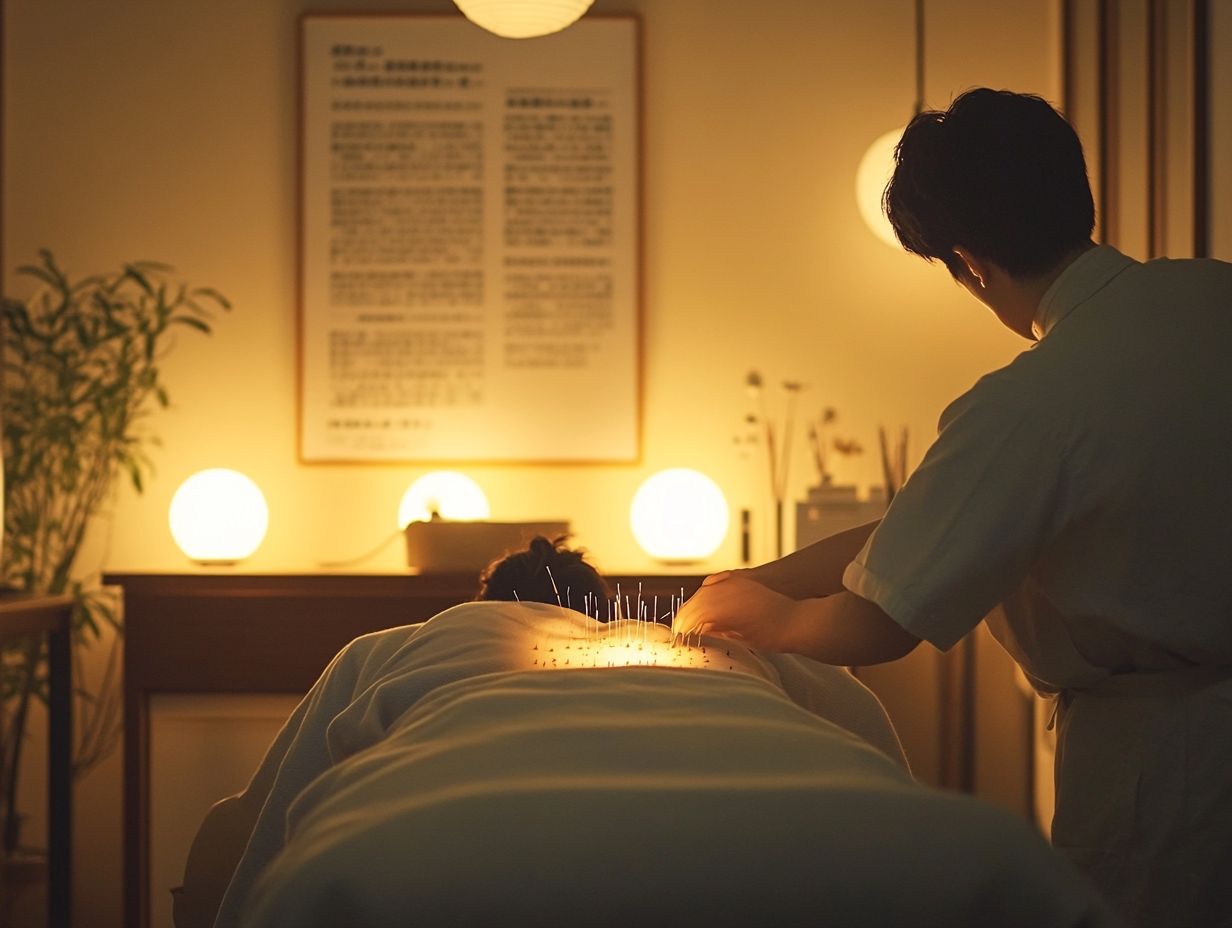
Various types of acupuncture exist, each utilizing distinctive techniques rooted in traditional Chinese medicine and tailored to meet your unique needs as a patient.
From classic methods involving the precise insertion of fine needles into specific points on your body to stimulate energy flow to Japanese acupuncture, which adopts a gentler approach and focuses on fewer points, each type offers its own specialized application.
Auricular acupuncture, for instance, targets points on your ear, effectively addressing issues like stress and addiction. This makes it particularly advantageous for those struggling with substance dependence or anxiety.
Then there’s electro-acupuncture, a method that uses small electrical currents along with the needles to relieve pain often recommended for chronic pain sufferers.
Understanding the nuances among these methods gives you the power to select the acupuncture style that aligns perfectly with your health goals.
What Are the Possible Side Effects of Acupuncture?
While acupuncture is generally considered safe, you might encounter some mild side effects, which are usually temporary and easily managed when treatment is provided by a licensed acupuncturist.
Common side effects include bruising or soreness at the needle insertion sites, caused by minor trauma to the skin or underlying tissue. This is just your body s way of reacting to the tiny needles, which, despite being sterile and incredibly fine, can elicit a slight reaction in some individuals.
You may also feel a touch of lightheadedness or fatigue after a session as your body adjusts to the therapy. However, it s essential to recognize that when performed by a skilled professional, acupuncture is safe, and the benefits typically far outweigh these minor inconveniences.
How Many Sessions of Acupuncture Are Needed for Results?
The number of acupuncture sessions necessary for noticeable results can vary significantly, depending on the specific condition you re addressing and your individual response to treatment.
If you have acute conditions, you may find that 3 to 6 sessions are enough. For chronic issues, you might need more sessions, possibly ranging from 8 to as many as 20.
Factors like the duration of your issue, your overall health, and your specific treatment goals will play vital roles in determining the ideal number of sessions for you.
For example, if you’re struggling with persistent pain, you may need to visit more frequently than someone simply aiming for general wellness.
Work with a qualified acupuncturist to create a treatment plan that suits your needs and maximizes your benefits.
What Are the Key Factors to Consider When Choosing an Acupuncturist?
When you’re considering acupuncture treatment, it’s crucial to weigh several key factors to ensure you choose a qualified practitioner.
Look into their education, licensure, and experience within the acupuncture community. Delve into the practitioner’s areas of specialization; some may excel in pain relief, while others focus on holistic wellness or specific health conditions.
Reading reviews from past patients can offer valuable insights into their treatment style and effectiveness. It’s essential to confirm that the acupuncturist holds a valid license, as this ensures compliance with safety standards and increases the likelihood of receiving effective care.
Taking these steps can greatly enhance your overall experience and the outcomes of your acupuncture journey.
Frequently Asked Questions
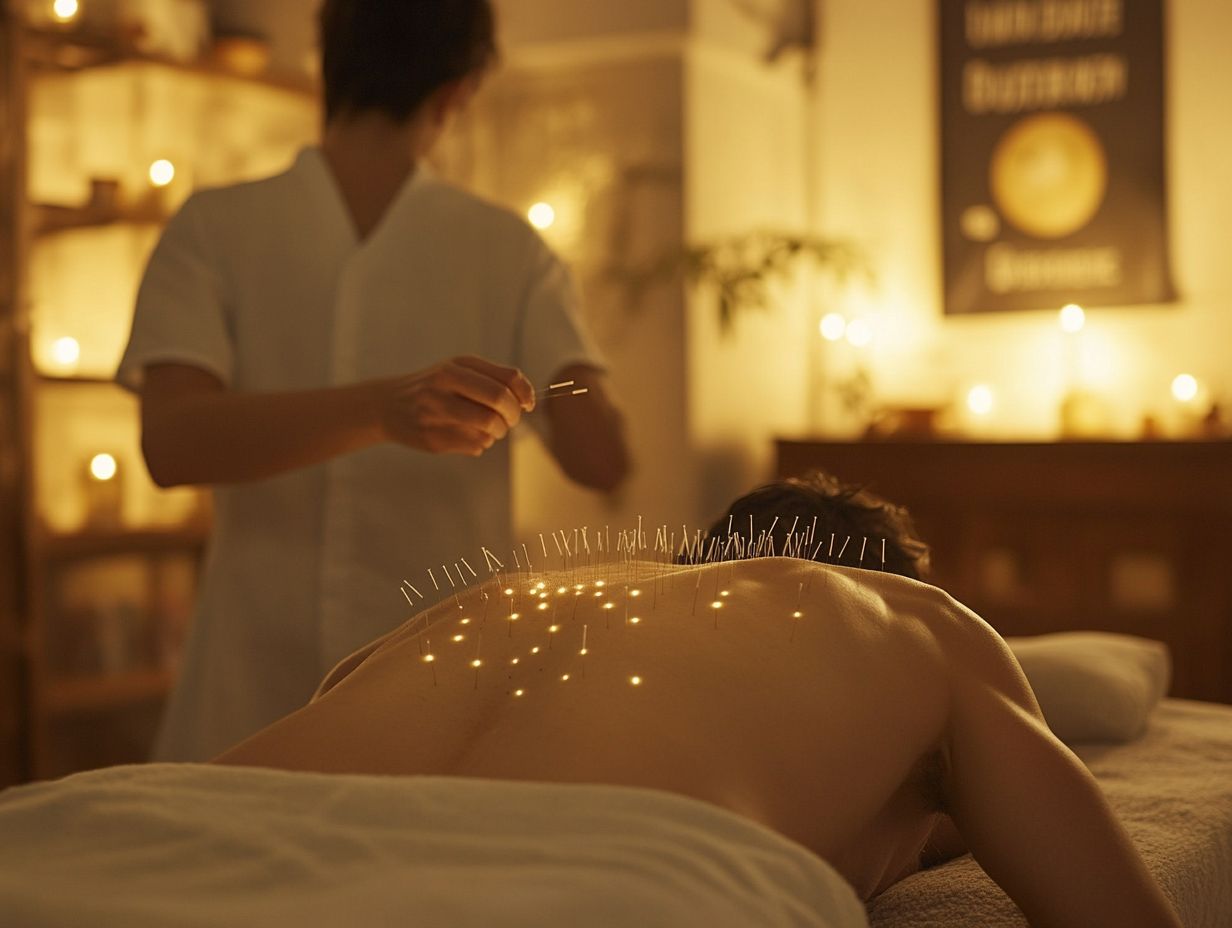
Is acupuncture painful?
This is a common misconception about acupuncture. While it does involve the insertion of thin needles, the process is generally painless. Most patients report feeling a slight prick or pinch, but the sensation quickly subsides. Many even find the acupuncture experience to be relaxing and energizing.
Can acupuncture cure all health problems?
No, acupuncture isn’t a cure-all. It’s effective for pain, stress, and other issues but should not replace medical treatment. Always consult a licensed practitioner for a proper diagnosis and treatment plan.
Does acupuncture only work for physical ailments?
No, it can also help with mental and emotional conditions. Many find relief from anxiety, depression, and even addiction through acupuncture.
Is acupuncture only for people who believe in traditional medicine?
Not at all! Anyone can benefit from acupuncture, regardless of their beliefs. It’s a whole-body approach to wellness, and many people have found success with it.
Are the effects of acupuncture only temporary?
The effects vary, but they aren’t always temporary. Some people feel relief after just one session, while others may need multiple treatments for lasting results.
Is acupuncture safe?
Yes, when done by a licensed practitioner, acupuncture is safe and low-risk. The needles are sterile and disposable. Always share any medical conditions or medications with your practitioner before starting treatment.




